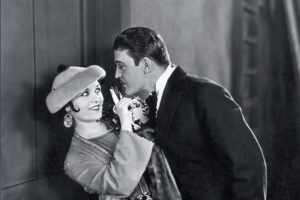Men are trash. Or at least, this is the consensus in places where single, educated, liberal, youngish women gather to lament the heterosexual state of affairs. Actually wanting to be loved by a man now represents an embarrassing shortcoming, and dating them an exercise in futility, like choosing the least-bad option from a menu on which everything is a little bit suspect. And this sentiment often takes the form of public griping about the relentless undeserving-ness of the men we can’t help but want.
Into this swamp of heteropessimism wades Curtis Sittenfeld, with the new novel, Romantic Comedy. Her protagonist, Sally, a writer for a late-night comedy show, invents the “Danny Horst Rule” — to describe the propensity of her male colleagues to date out of their league. (The character after which it is named is a thinly-veiled avatar for Pete Davidson; Night Owls, the comedy show, for Saturday Night Live.) Women in the industry, Sally notes, never manage to do the same.
“Enter Noah Brewster, a pop music sensation with a reputation for dating models,” reads the blurb. He and Sally hit it off “instantly, and as they collaborate on one sketch after another, she begins to wonder if there might actually be sparks flying. But this isn’t a romantic comedy — it’s real life. And in real life, someone like him would never date someone like her… right?”
“… right?”, as they say, is doing a lot of work here. The entire plot of Romantic Comedy hinges on Sally’s supposedly unshakeable belief in her own unworthiness, which makes it very now; the insecure, self-sabotaging heroine is to the 2023 romance what the adorably clumsy girl was to the rom-coms of the Nineties. But what’s more remarkable about the novel is how it straddles two different worlds, and worldviews, when it comes to love: here we have the age-old yearning for a happy ending, right alongside the current vogue for being ashamed of wanting one. Sittenfeld somehow captures not just the current state of the romantic comedy, but of heterosexual romance more broadly — and in doing so, reveals that there is nothing funny about it.
It has been a quarter of a century since a girl stood in front of a boy and asked for him to love her, and 35 years since Harry met Sally. Now, we have Sittenfeld’s Sally, glumly deciding not to break off her tepid occasional relationship with a guy she met online, because “doing so would result in my needing to find another sexual outlet, meaning I’d have to resubscribe to a hookup app and meet enough strangers at enough bars to determine which one probably wouldn’t kill me if we went back to my apartment”.
Sally inhabits the same world, and worldview, as Sittenfeld’s professional, liberal, millennial target reader; their anxieties and preoccupations are also hers, as is their unifying conviction that men will inevitably disappoint you. It is only a matter of when and how. The outing of bad men has come to function as a sort of single woman’s spectator sport, as if the inevitable unmasking of a boyfriend as a liar, a cheater, a serial killer, or (worst of all) a Republican is not just fun in its own right but actually the whole point.
It’s not difficult to tease out the contributing factors that led us here. The highly individualised notion that relationships should be first and foremost about self-fulfilment. The devaluation of loyalty and companionship. A therapised culture that treats the process of falling in love and establishing intimacy as something sinister and pathological. And of course, the pervasive (and not incorrect) sense that someone new is only ever a Tinder swipe away. It’s not a coincidence, in this cynical moment, that our most viral relationship stories are not about falling in love, but breaking up, giving rise to a genre of personal essay that is ostensibly about female empowerment but works much more like something akin to revenge porn.
To air your ex’s dirty laundry in the pages of a national publication is increasingly presented as a radical act of self-care, sisterhood, even social justice. As one refreshingly critical response put it: “Do this and you will be met with a huge wave of sympathy from strangers on the internet. They will applaud you as a brave truth teller, commendably taking a strike for women everywhere, against the common enemy.”
The ex-boyfriends in these essays are liars, cheaters, hypocrites. They are threatened and resentful when a woman succeeds. They are sexually entitled and emotionally withholding. But most of all, they are ordinary. It is understood that what they did to their long-suffering girlfriends is simply what men do to women — or, more to the point, what they make women do to themselves. “The ability to bend an inch at a time while seeming to stand up straight is a useful and gendered skill. Most women I know do it regularly,” wrote one such author in the Guardian. “They bend until they’re pretzeled and then blame themselves for the body aches.”
Sally’s failed starter marriage (already over by the time the book begins) could be ripped from one of the aforementioned viral essays: when she flies to New York for her Night Owls interview and gets offered the gig on the spot, her husband, a lawyer, not only assumes she’ll decline, but confesses that he only indulged her repeatedly auditioning for the job because he assumed she’d never get it. Sally, of course, cites this as evidence that her ex “didn’t think I was funny or talented” — as opposed to, say, an awareness of the statistical likelihood of a non-industry professional becoming a literal overnight success in the most elite comedy writers’ room in the country. This penchant for taking things personally rears its head in her new relationship, too: “If I were a hot twenty-five-year-old actress, would you have dropped my hand like that?” she snipes at Noah, after the two are ambushed by paparazzi.
Sittenfeld, surely, could not have imagined how perfectly this book would slot into our current cultural obsession with the shortcomings of heterosexual men. A dim view of romance, of men, and of the women who want them, is ubiquitous enough that it permeates the New York Times review of Romantic Comedy, in which writer Scaachi Koul scathingly describes Sally’s pop star suitor as “a manic pixie dream boy for straight white women of a certain age”. (As opposed to the manic pixie dream girl who populated the turn-of-the-century rom-com.) These men, it’s understood, do not exist in real life.
And yet, a recent, much-discussed break-up piece by poet Maggie Smith gave rise to the fascinating spectacle of, well, straight white men of a certain age, violently competing for the role of real life manic pixie dream boy. “Can you imagine being partnered with a writer as successful as Maggie Smith — MAGGIE SMITH — and you’re pissed off that she’s not doing the dishes enough or isn’t folding the laundry or running the vacuum or doing bath time as much as you are sometimes,” read one representative thread — from a man whose Bumble profile almost certainly includes a photograph of himself in a This Is What a Feminist Looks Like T-shirt. “[Come] on man your partner is living the dream, and even if she toiled in obscurity, fuck, support her with your every effort.”
What are we to make of the notion that even in this hypothetical paradise of gender equity, a woman is not respected for her status as an equal contributor to the household, but rather indulged, on the basis of her sex, in a way that we categorically do not associate with adults?
We can only look back with chagrin, much like the protagonist of one of those Nineties movies. But the sad-verging-on-nonexistent state of the rom-com in 2023 surely stems, at least in part, from the conflicted relationship we have with the love stories we tell inside the confines of our own heads. A book like Romantic Comedy is the product of a world full of generalised complaints about the glut of exceptional women for whom no man can possibly be good enough: these are not stories about men, but about women, and how we wish to see ourselves in the narrative of our own lives. If the novel is a mirror for young women’s anxieties, it’s not an ordinary one, but more like one of those fairy-tale looking glasses that is more likely to tell you flattering lies than the truth.
Of course, we already have love stories about people (men, usually) whose desire for someone (not always a woman) is inextricably intertwined with shame and contempt: Pretty Woman, Brokeback Mountain, Ever After. The idea that the shame and contempt is valid, though, or that the person who feels it can be the hero without ever confronting her hubris: that’s new. When we start out ashamed of who and what we want — and what we want is an entire category of person pre-labelled as “trash” — what kind of stories do we tell to justify wanting it anyway? To get it without loosening our grip on our sense of superiority?
The answer, at least sometimes, seems to be that we retreat into helplessness. Women relinquish their agency in favour of vague mumblings about how we can hardly be blamed for our poor romantic outcomes. As in Romantic Comedy, this defeatism sometimes masks itself as vulnerability. It’s not, though. Sally doesn’t believe she’s unworthy of love. It’s more cynical than that. She just doesn’t really believe in love, full stop. What with all this male power, privilege, and patriarchy swirling like a miasma over our lives, there’s no hope of it. And if the old avatar for romantic regret was Joan Jett snarling, “I hate myself for loving you,” our new one looks more like Taylor Swift moaning, “Look what you made me do” — as she carefully, deliberately shreds the reputation of every man who broke her heart.
Disclaimer
Some of the posts we share are controversial and we do not necessarily agree with them in the whole extend. Sometimes we agree with the content or part of it but we do not agree with the narration or language. Nevertheless we find them somehow interesting, valuable and/or informative or we share them, because we strongly believe in freedom of speech, free press and journalism. We strongly encourage you to have a critical approach to all the content, do your own research and analysis to build your own opinion.
We would be glad to have your feedback.
Source: UnHerd Read the original article here: https://unherd.com/




